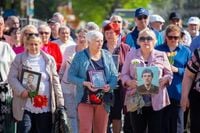Residents of Balti, Moldova, gathered on April 25, 2025, to commemorate the victims of the Chernobyl disaster, marking the 39th anniversary of the catastrophic event that occurred on April 26, 1986. The ceremony included a march through the northern Moldovan capital, where flowers were laid at the monument dedicated to the victims of the tragedy. This poignant event aimed to raise awareness about the risks and consequences of nuclear disasters, particularly among younger generations who may be unaware of the historical significance of Chernobyl.
Serghei Samrai, president of the Balti territorial organization of the Public Association "Chernobyl Union of Moldova," emphasized the importance of informing young people about the disaster. "People need to be informed about that catastrophe, especially young people, who know too little about what happened 39 years ago at Chernobyl," he stated. His comments reflect a broader concern that the lessons of Chernobyl, which took thousands of lives and forever altered the futures of countless others, must not be forgotten.
The local authorities recognized the courage and sacrifice of the liquidators—those who worked to mitigate the disaster's aftermath. According to Samrai, there are currently 74 liquidators still alive in Balti, though not all could attend the commemoration due to health issues. The message from the authorities highlighted the heroism displayed by these individuals, who "showed courage, heroism and strength of spirit, sacrificing their lives and health" during the cleanup efforts.
Meanwhile, across the sea in Cork, Ireland, a similar commemoration took place at Fitzgerald's Park. On April 26, 2025, the Lord Mayor of Cork, Dan Boyle, alongside the Ukrainian ambassador and members of the local Ukrainian community, gathered to honor the victims of the Chernobyl disaster. This annual event, organized by the charity The Greater Chernobyl Cause, serves not only to remember those lost in the disaster but also to raise awareness about the ongoing humanitarian crisis in Ukraine.
The Chernobyl disaster, which remains the worst nuclear accident in history, involved a catastrophic explosion and fire at the power plant, releasing radioactive materials into the atmosphere. The immediate aftermath saw dozens of fatalities, but the long-term effects have been even more devastating. A 2006 World Health Organization study estimated that there could be as many as 9,000 cancer-related deaths resulting from the radiation exposure in Ukraine, Belarus, and Russia.
During the Cork ceremony, attendees participated in a range of activities, including poetry readings, music performances, and prayers, all aimed at honoring the memory of those affected by the disaster. A minute of silence was observed, followed by the Last Post, and the flag was lowered to half-mast as a mark of respect. Fiona Corcoran, founder of The Greater Chernobyl Cause, expressed solidarity with the Ukrainian people amid ongoing conflicts. "We stand in solidarity with our Ukrainian brothers and sisters, who up until three years ago had homes, security, and normal lives," she said, underscoring the shared history and struggles faced by the Ukrainian community.
Corcoran's charity has been active in providing humanitarian aid across Ukraine, particularly in regions impacted by the Chernobyl disaster. As of February 2025, approximately 7,059 Ukrainian refugees were residing in Cork, with 1,500 in Cork city and 2,400 in Cork county, according to the National Association of Support Groups (NASC). This statistic highlights the ongoing need for support and solidarity within the community as they navigate the challenges of displacement.
The dual commemorations in Balti and Cork serve as a reminder of the far-reaching impact of the Chernobyl disaster, not only in the immediate vicinity of the nuclear plant but also in communities far removed from the site. Both events reflect a commitment to remembering the past and ensuring that the lessons learned from such a tragic event are not lost on future generations.
As nations continue to grapple with the implications of nuclear energy and its associated risks, the memories of Chernobyl remain a powerful testament to the need for vigilance and awareness. The stories of the liquidators, the victims, and the survivors echo through these commemorative events, urging society to remain informed and engaged in discussions about nuclear safety and disaster preparedness.
In the face of ongoing challenges, including the humanitarian crisis in Ukraine and the legacy of Chernobyl, communities like Balti and Cork are coming together to honor the past while advocating for a safer and more informed future. The resilience shown by those affected by the disaster and the continued support from international communities highlight the enduring spirit of solidarity in the face of tragedy.





